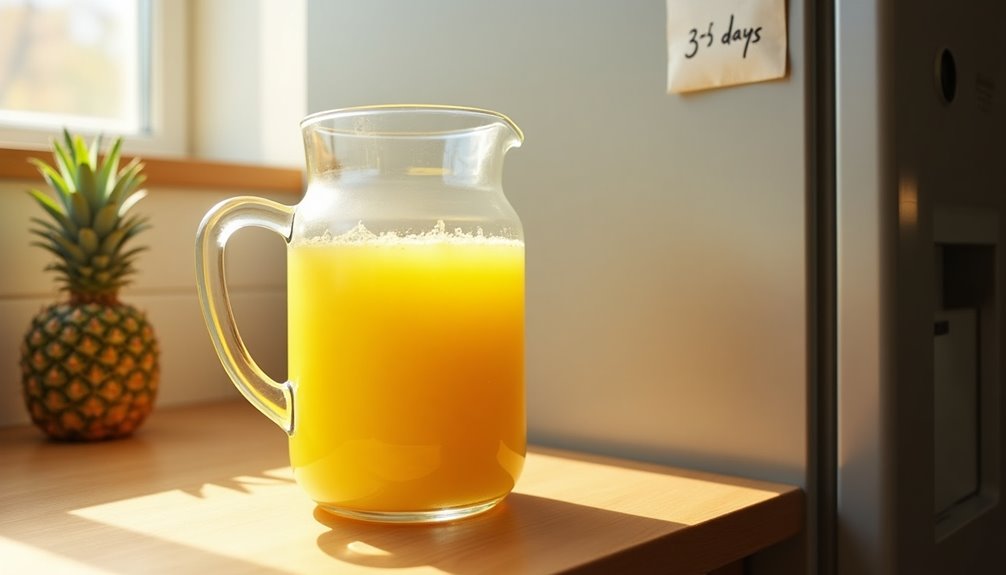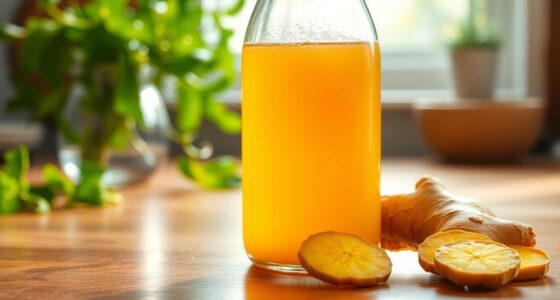Opened pineapple juice will stay good in the fridge for about 7 to 10 days if you store it properly. Make sure to refrigerate it in an airtight container to prevent air exposure and keep it in the coldest part of the fridge. Look out for off odors, unusual flavors, or visible mold, as these are signs of spoilage. If you want to know more about how to store it effectively, just keep going!
Key Takeaways
- Opened pineapple juice can last 7 to 10 days in the fridge if stored properly.
- Freshly made or cold-pressed pineapple juice should be consumed within 4 to 5 days.
- Store juice in airtight containers to reduce oxidation and maintain freshness.
- Signs of spoilage include off odors, unusual flavors, and visible mold.
- For optimal taste, consume pineapple juice within the recommended timeframe.

When you open a bottle of pineapple juice, you might wonder how long it stays fresh in your fridge. It's a common question, especially if you're planning to use it in smoothies or cocktails over the next few days. Generally, opened pineapple juice lasts about 7 to 10 days when refrigerated properly. To ensure that you enjoy the best quality juice during this period, it's crucial to store it correctly. Keeping the juice in an airtight container and maintaining a fridge temperature below 39 °F (4 °C) will help maximize its freshness.
If you've opted for freshly made or cold-pressed pineapple juice, you'll want to consume it within 4 to 5 days after refrigeration. This type of juice is less processed, which means it retains its nutrients and flavor better, but it also means it can spoil more quickly. When storing your juice, always make sure it's sealed tightly to prevent exposure to air, which can lead to oxidation and degradation of quality. A good airtight container is essential here.
While pineapple juice can be delicious and refreshing, it's important to be aware of the signs of spoilage. If you notice off odors, unusual flavors, or visible mold, it's time to toss that juice. These indicators are crucial because, although some store-bought pineapple juices might still be safe to drink even after they've been opened for a week, their quality degrades significantly over time. You may find that the taste and freshness diminish, which is why it's wise to keep an eye on how long it's been since you opened the bottle.
To enjoy your pineapple juice at its peak, make it a habit to consume within the recommended timeframe. Pineapple juice is generally safe to drink for a short period after the initial 7 to 10 days, but the flavors won’t be as vibrant, and you mightn’t get the same refreshing experience you initially expected. If you plan to use the juice infrequently, consider buying smaller containers or even making your own in smaller batches. Additionally, proper storage can significantly extend the lifespan of your pineapple juice while preserving its quality. When learning how to store pineapple juice, make sure to keep it in an airtight container and refrigerate it promptly after opening. Freezing is also an excellent option if you want to maintain freshness for a longer period; just be sure to leave some space at the top of the container to allow for expansion.
Storing your refrigerated pineapple juice properly is key to maintaining its taste and nutritional benefits. If you find yourself with leftover juice, try to incorporate it into recipes or drinks quickly so you don't waste it.
Whether you're mixing it into a tropical smoothie or using it as a marinade, there are plenty of ways to keep that opened pineapple juice from going to waste. Enjoy your juice while it's fresh, and remember that proper storage is the secret to that delightful tropical taste lasting as long as possible!
Frequently Asked Questions
Does Pineapple Juice Go Bad in Refrigerator?
Yes, pineapple juice can go bad in the refrigerator. If you notice any off odors, strange flavors, or visible mold, it's best to toss it out.
To keep your juice fresh longer, store it in an airtight container and keep it away from light and heat sources.
How Long Is an Open Can of Pineapple Juice Good For?
If you've opened a can of pineapple juice, you should consume it within 5 to 7 days.
To keep its quality, transfer the juice into a sealed container instead of leaving it in the can.
Always check for any signs of spoilage, like off odors or mold, and toss it if you notice anything unusual.
Also, inspect the can for leaks or damage before opening, as that can affect safety.
How Long Does Del Monte Pineapple Juice Last After Opening?
Picture a vibrant, fresh pineapple beside a sealed bottle of Del Monte juice.
Once you open that bottle, you've got about 7 to 10 days of deliciousness ahead, provided you seal it tightly in an airtight container.
After the first week, the quality might start to dip, so keep an eye out for off odors or changes in appearance.
If you need more time, consider freezing it for up to 12 months!
Can Pineapple Last 2 Weeks in Fridge?
You might wonder if pineapple can last two weeks in the fridge. Unfortunately, it typically doesn't.
Once you've cut or opened it, pineapple should ideally be consumed within five to seven days for the best flavor and freshness.
If you're storing it properly in an airtight container, you might stretch it a bit longer, but always check for any signs of spoilage before consuming it.
Trust your senses—if it smells off, it's best to toss it.
Conclusion
In the grand kingdom of your fridge, pineapple juice reigns supreme for about 5 to 7 days once opened. Beyond that, it's like a forgotten treasure, losing its vibrant charm and zesty goodness. Just imagine a sad, wilted pineapple juice carton, sitting in the corner, weeping for days of glory long gone! So, sip it fresh and let those tropical vibes dance in your taste buds while you can—because nobody wants a sad juice in their life!
Cindy thoroughly researches juicing trends, techniques, and recipes to provide readers with practical advice and inspiration. Her writing style is accessible, engaging, and designed to make complex concepts easy to understand. Cindy’s dedication to promoting the advantages of juicing shines through her work, empowering readers to make positive changes in their lives through the simple act of juicing.











